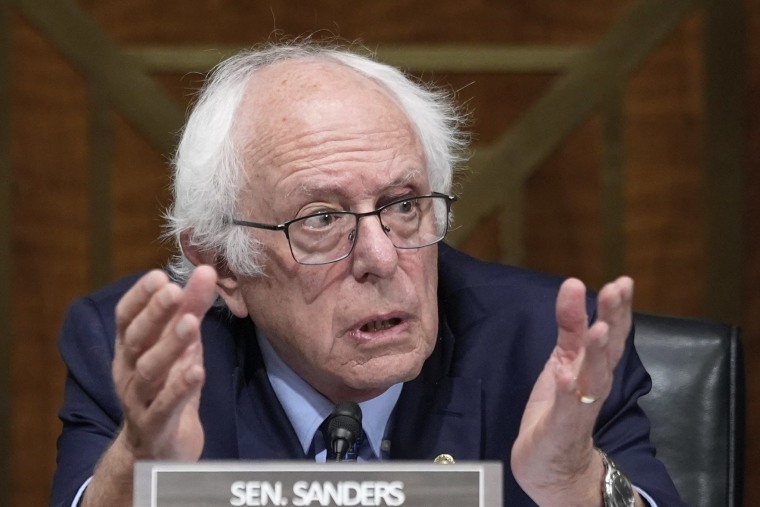WASHINGTON — Sen. Bernie Sanders, I-Vt., on Tuesday extracted a meager commitment from Novo Nordisk CEO Lars Fruergaard Jørgensen to meet with pharmacy benefits managers to discuss lowering the cost of its blockbuster drugs Ozempic and Wegovy.
During the often tense hearing before the Senate Committee on Health, Education, Labor and Pensions, Jørgensen shifted the blame for the drugs’ high prices to the pharmacy benefits managers (PBMs), saying that Ozempic and Wegovy would no longer be offered by the middlemen if they had a lower list price.
A “high list price,” he said, “is more likely to lead to more access to patients.”
Sanders, however, said that he recently received commitments in writing from “all the major PBMs” — UnitedHealth Group’s Optum Rx, CVS Health’s Caremark and Cigna’s Express Scripts — that if Novo Nordisk substantially reduced the list price, they wouldn’t take Ozempic and Wegovy off their formularies, or the list of drugs they offer. PBMs work with insurance companies to negotiate discounts or rebates on drugs in return for coverage. PBMs have been criticized for pushing patents to higher-priced drugs.
“If in fact they keep their commitment, will Novo Nordisk substantially lower the list price of Ozempic and Wegovy in the U.S.?” Sanders, who chairs the committee, asked.
Jørgensen initially dodged a firm response, detailing numerous complications. “I have to understand what this entails,” he said.
“But I’m asking you again, will you work with this committee and the PBMs?” Sanders asked.
“Yes,” Jørgensen replied.
“No. 2,” Sanders said. “I understand that it’s complicated, will you in fact substantially lower the prices in this country?”
“If it works in a way where patients get access to a more affordable medicine, and we have to make certain that it actually happens,” Jørgensen said.
Sanders has been vocal about his frustrations over how much Novo Nordisk charges Americans for both Ozempic (used to treat type 2 diabetes) and Wegovy (approved for weight loss).
“In general, we pay by far the highest prices in the world for prescription drugs. Same exact medicine sold in Canada, Europe is a fraction of what it is in the United States,” Sanders said in an interview Monday. “The result of that is that hundreds of thousands of people in this country who desperately need this product will not be able to afford it.”

A previously released committee report showed that the cost of Wegovy is significantly less in European countries — from $140 a month in Germany to $92 a month in the United Kingdom. Americans pay about $1,349 a month for the exact same drug.
During his opening statement Tuesday, Jørgensen defended the drugmaker’s pricing structure.
“Type 2 diabetes costs the U.S. approximately $413 billion every year and obesity costs the U.S. $1.7 trillion, and we all know the physical and emotional toll these diseases have,” he said. “That’s why we effort to secure public and private insurance coverage for patients with Type 2 diabetes and obesity.”
A Department ofHealth and Human Services report in February found that in 2022, prices of all drugs in the U.S. — both brand name and generic — were nearly three times as high as in other wealthy countries.
Ozempic’s net price has gone down by 40% since it was introduced in the U.S., Novo Nordisk said last week. Wegovy, too, is “following a similar trajectory.” The net price is how much money a drug company makes from a drug after rebates and discounts.
Jørgensen wasn’t alone in voicing his ire for pharmacy benefit managers.
Sen. Tim Kaine, D-Va, said while he supported the focus on the pharmaceutical industry, “we’re letting PBMs get away scot-free.”
“One industry researches, one doesn’t. One produces life-saving treatments, one doesn’t,” Kaine said. “One industry is super-duper profitable and the other profitable, but the one that is super profitable isn’t doing any research and not producing any life-saving innovations.”
On Friday, the Federal Trade Commission sued Optum Rx, Caremark and Express Scripts in the U.S., accusing them of “artificially” inflating the price of insulin.
Jørgensen claimed that for every dollar Novo Nordisk makes, it gives 74 cents to PBMs and insurance companies.
“When we set a list price, we have to take into consideration what are the rebates we have to pay because, unless we pay big rebates into the system, when we negotiate rebates with PBMs, we are not getting access to the formulary,” Jørgensen said.
That’s why, he argued, higher prices ensure that a PBM will cover Novo Nordisk’s drugs.
Larry Levitt, executive vice president of health policy at KFF, a nonprofit group that researches health policy issues, said there’s an “arms race in pharmaceutical pricing,” where higher list prices from drugmakers lead to larger rebates for PBMs, which in turn lead to higher list prices. In other words, drugmakers may be pressured to increase the list price to satisfy PBMs’ demands for higher rebates.
In the end, Levitt said, patients with so-called high deductible plans and the uninsured end up paying more.
Republicans on the committee largely discouraged government pressure to lower the list price.
Doing so could hinder the development of new life-saving medicines, said Sen. Bill Cassidy, R-La., ranking member of the committee, using an argument often shared by the pharmaceutical industry.
“Without a profit motive, without something in return, it’s unclear that these drugs, or any drug, is going to be developed,” Cassidy said.






